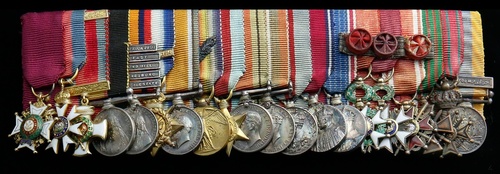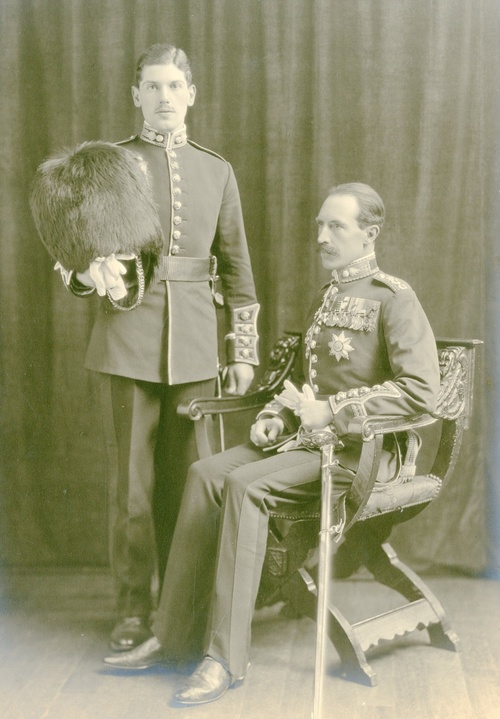Auction: 17003 - Orders, Decorations and Medals
Lot: 636
Sold by Order of a Direct Descendant
On being asked how to avoid causing offence with seating plans, Sir George Clive, the Marshal of the Diplomatic Corps, responded:
"Don't worry. Those that mind don't matter and those that matter don't mind."
The highly impressive - and well-documented - mounted group of dress miniature medals worn by Lieutenant-General Sir George Clive, G.C.V.O., K.C.B., C.M.G., D.S.O., a long-served Marshal of the Diplomatic Corps and late the Grenadiers
The Most Honourable Order of the Bath, gold and enamel; The Most Distinguished Order of St. Michal and St. George, gold and enamel; Distinguished Service Order, G.V.R., gold and enamel; Queen's Sudan 1896-98; Queen's South Africa 1899-1902, 5 clasps, Orange Free State, Johannesburg, Diamond Hill, Belfast, South Africa 1901; 1914 Star, with clasp; British War and Victory Medals, M.I.D. oak leaf; 1939-45 Star; Defence and War Medals 1939-45; Coronation 1911, Jubilee 1935; Coronation 1937; France, Legion of Honour, silver, silver-gilt and enamel, with rosette on riband; Belgium, Order of the Crown, silver, silver-gilt and enamel, with rosette on riband; Russia, Order of St. Stanislaus, with swords, silver, silver-gilt and enamel, with rosette on riband; France, Croix de Guerre 1914-18; Belgium, Croix de Guerre 1914-18; Khedive's Sudan 1896-1908, 1 clasp, Khartoum, mounted court-style as worn by 'Spink & Son Ltd., 5,6, & 7 King Street', generally good very fine (20)
SALEROOM NOTICE: The large format photograph will only be available as a high resolution scan'
George Sydney Clive, a scion of Clive of India's family, was born on 16 July 1874, the son of General Edward Clive and his wife, Isabel Webb. His father was a soldier and liberal Member of Parliament for Hereford (1869-71). Following in his father's footsteps, young George was educated at Harrow School and the R.M.C. Sandhurst and was commissioned in the Grenadier Guards in 1883.
One of his father's earliest appointments had been as Instructor of Musketry in the Grenadier Guards in 1857, and it appears that this was the first course undertaken by his son prior to service abroad. Promoted to Lieutenant in October 1897, he took part in the military expedition to the Sudan and was advanced to Captain in January 1900, during a temporary appointment as Adjutant of his Battalion. He next saw action in the Boer War, when he was with General Roberts and the 3rd Grenadiers in the advance on Pretoria, and fought at the actions at Johannesburg, Diamond Hill and Belfast.
Having then attended Staff College at Camberley in 1903, he became a General Staff Officer at the War Office in 1905.
Clive subsequently served in the Great War as Head of the British Mission at French Army Headquarters, originally at Vitry-le-François in the Marne department, but rapid German advances in the early stages of the war forced its withdrawal to Chantilly, near Paris. For these services he was awarded the D.S.O. and invested as a Companion of the Order of the Bath, such distinction in addition to the French Croix de Guerre and Grand Officer of the Legion of Honour, the Belgian Croix de Guerre and Order of the Crown, and the Russian Order of St. Stanislaus, with swords; his extensive 'war diaries' - a remarkable eye-witness account of secret meetings and decisions made by the great and the good - are held at King's College, London.
In 1919, Clive was appointed to the important role of Military Governor of Cologne:
'When the Armistice was signed between Germany and the Allied powers on November, 11th, 1918, the citizens of Cologne learnt that they had little more than three weeks to prepare for a British occupation. The humiliation of defeat and the depressing prospect of alien martial law were, however, tempered by the awareness that the British would insulate Cologne from the chaos of revolution that was sweeping through Germany. The first British cavalry patrols entered Cologne at midday on December 6th and shortly afterwards a column of armoured cars arrived, escorted General Lawson to the Rathaus for a preliminary interview with Dr. Adenauer, the Lord Mayor, who was relieved that his city was about to be policed by a disciplined force but apprehensive about the troops' future relations with the inhabitants' (History Today; 'Cologne and the British', refers).
The Lord Mayor's concerns were duly alleviated by Clive's command and establishment of stability and he returned to Aldershot to command the 1st Infantry Brigade. He was subsequently appointed British Military Representative to the Armaments Commission of the League of Nations, becoming Major-General and Military Attache to Paris in 1924. He was appointed Director of Personal Services at the War Office in 1928 and Military Secretary in 1930 and was invested as Knight Commander of the Order of the Bath in 1933.
Clive, who was placed on the Retired List as a Lieutenant-General in 1934, served as Marshal of the Diplomatic Corps from 1934 to 1946. Perhaps one of his less enjoyable tasks as Marshal came in 1936, when he had to welcome Joachim von Ribbentrop to London as Hitler's newly appointed ambassador. Ribbentrop appears to have made a hectoring anti-Russian speech on his arrival but surviving photographs show Clive looking his charming and diplomatic self.
The General, who also served as High Sheriff, J.P. and Deputy Lieutenant for Herefordshire, died in a disastrous fire at his family home, Perrystone Court, near Ross-on-Wye, in October 1959.
On 26 March 1901 Clive married Madeleine Buxton, and the couple went on to have three sons and two daughters. One of their sons, Archer Clive, would go on to win a D.S.O. and Bar, together with an M.C. in the Second World War, for notable actions in the retreat to Dunkirk and in North Africa; in common with his father and grandfather, he attended Harrow and Sandhurst.
Sold with a large quantity of original documentation, including:
(i)
Warrant for the recipient's appointment to G.C.V.O., dated 11 May 1937, with related Statutes of the Order.
(ii)
Warrant for his appointment to K.C.B., dated 3 June 1933, and for C.B., dated 1 January 1918, together with related Statutes of the Order.
(iii)
Warrant for the recipient's appointment to Grand Officer of the Legion of Honour to 'M. Le Brigadier General Clive', dated 28 July 1917, with related letter from the Grand Quartier General des Armees De L'Est.
(iv)
Certificate for the recipient's award of Croix de Guerre, citation by Wielhorski, printed by H. Chachoin, detailing - in French - the citation for the award, notably enabling co-operation between the armies of France and Great Britain, dated 10 July 1918.
(v)
Letter from the Belgian Ministry of Foreign Affairs concerning the recipient's appointment as Commander of the Order of the Crown, dated 11 July 1918.
(vi)
Buckingham Palace 'Restricted Permission to Wear' document, concerning his Grand Croix de l'Ordre de Leopold II, dated 7 December 1937; and letters from the Ministry of Belgian Foreign Affairs and the Ambassador of Belgium regarding the Order, dated 6 January 1938.
(vii)
Warrant appointing the recipient Grand Cross of the Order of the Crown of Roumania, dated 11 November 1938, together with Buckingham Palace 'Restricted Permission to Wear' document.
(viii)
Commission scroll appointing 'George Sidney Clive, Second Lieutenant, Land Forces', dated 21 October 1893.
(ix)
Lord Chamberlain's Office certificate appointing the recipient Marshal of the Diplomatic Corps, dated 19 October 1934.
(x)
Warrant appointing the recipient a Deputy Lieutenant of the County of Hereford, dated 12 December 1938.
(xi)
War Organisation of the British Red Cross Society and Order of St. John of Jerusalem, Commissioner in France appointment document, dated 9 November 1939.
(xii)
Invitation to the Coronation of Her Majesty Queen Elizabeth II 'By Command of the Queen, the Earl Marshal is directed to invite Lieutenant General Sir Sydney and Lady Clive to be present at the Abbey Church of Westminster on the 2nd day of June, 1953'; together with original O.H.M.S. envelope, addressed to 'Perrystone Court, Ross, Herefordshire.'
(xiii)
Portrait photographs of the recipient in full uniform, including images wearing his foreign decorations, together with a group photograph of Lieutenant-General Sir Sydney Clive, President of the Union Jack Club, seated next to King George VI, and another portrait photograph dated 15 February 1952.
Please see Lot 636 for his son's full-size awards.
Subject to 20% VAT on Buyer’s Premium. For more information please view Terms and Conditions for Buyers.
Sold for
£2,100
Sale 17003 Notices
The large format photograph will only be available as a high resolution scan







